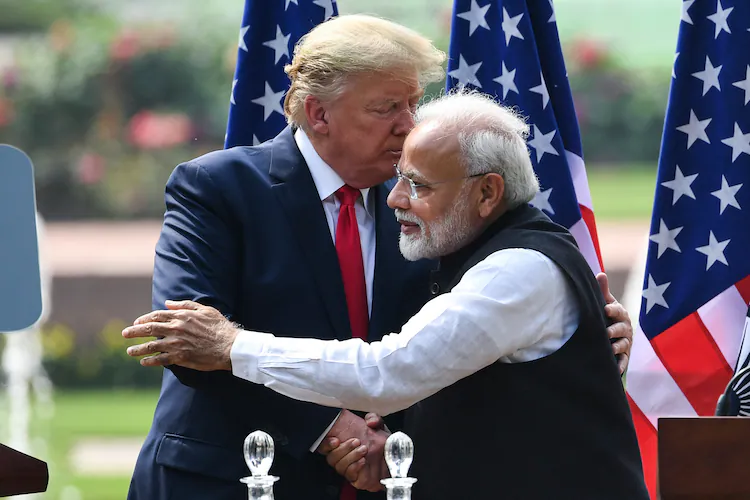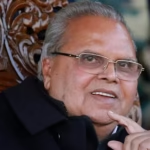The two leaders exchanged bear hugs, lavished praise on each other, and appeared side by side at stadium rallies — a significant optics boost for both populist figures who share ideological similarities. Each referred to the other as a close friend.
In India, the camaraderie between Prime Minister Narendra Modi and U.S. President Donald Trump was viewed as a unique bond — until a series of developments strained the relationship.
From Trump’s tariffs and India’s oil imports from Russia to a perceived U.S. tilt toward Pakistan, friction between New Delhi and Washington has become increasingly evident. Much of it has played out far from official channels — and unsurprisingly, through Trump’s social media posts.
This shift has left policy experts questioning whether the once-close rapport between the two leaders is now a thing of the past, even though Trump has avoided mentioning Prime Minister Narendra Modi directly online. Some observers believe the cooling relationship could jeopardize a strategic partnership that has been carefully built over decades.
“This is a testing time for the relationship,” said Ashok Malik, a former policy adviser to India’s Ministry of External Affairs.
The White House did not immediately respond to a request for comment.
The latest flashpoint came last week, when Trump announced a 25% tariff on Indian goods, along with an unspecified penalty tied to India’s continued purchase of Russian oil. For New Delhi, such a move from its largest trading partner could have wide-reaching effects across industries, and it triggered a wave of concern—amplified when Trump, in a social media post, referred to India’s economy as “dead.”
According to a White House official, Trump’s statements reflect his frustration with the slow progress of trade talks with India. The official, who spoke on condition of anonymity, emphasized that Trump is not pursuing a strategic realignment with Pakistan but is instead applying pressure as a negotiation tactic.
On Monday, Trump doubled down on Truth Social, accusing India of buying “massive amounts” of Russian oil and selling it on the open market “for big profits.”
“They don’t care how many people in Ukraine are being killed by the Russian War Machine. Because of this, I will be substantially raising the Tariff paid by India to the USA,” he wrote.
This messaging appears to have struck a nerve in New Delhi. Modi’s administration has been trying to finalize a trade deal with the Trump team while balancing India’s protectionist policies with efforts to open markets to more American goods.
“Strenuous, uninterrupted, and bipartisan efforts in both capitals over the past 25 years are being put at risk — not just by the tariffs but by fast and loose statements and social media posts,” said Malik, now head of the India chapter of The Asia Group, a U.S.-based advisory firm.
Malik noted that the current deal offered by India is “the most expansive in this country’s history,” referring to reports that India may allow greater access to certain U.S. agricultural products — a sensitive issue for PM Modi, who previously faced prolonged farmer protests.
Though the present tensions escalated over tariffs, signs of strain have been growing for some time — particularly as Trump appeared to draw closer to Pakistan, India’s nuclear-armed neighbor and rival.
In May, India and Pakistan engaged in military exchanges following a terror attack in Kashmir’s Pahalgam, allegedly by Pakistan-based militants. But it was Trump’s repeated claims of offering mediation on the Kashmir dispute that caused serious discomfort for New Delhi. Modi’s government has consistently rejected third-party involvement in Kashmir, maintaining that it is an internal matter.
Since making that offer, Trump has claimed nearly two dozen times that he “brokered peace” between India and Pakistan. For Modi, who has built his domestic and international image on being tough on Pakistan and diplomatically isolating it, such remarks are politically risky.
Last week, Modi appeared to dismiss Trump’s mediation claims after facing pressure from the Opposition. Without naming Trump, he stated that “no country in the world stopped” the hostilities between India and Pakistan.
Further fanning tensions, Trump has made overtures to Pakistan — praising its counterterrorism efforts, announcing a “massive” oil exploration deal, and even suggesting that India might eventually have to buy oil from Islamabad. He also hosted a top Pakistani military official for a private lunch, adding to the perception of a strategic shift.
Sreeram Sundar Chaulia of the Jindal School of International Affairs in New Delhi said Trump’s sudden praise for Pakistan has “definitely soured” public and diplomatic sentiment in India.
“The best-case scenario is that this is just a passing Trump whim,” Chaulia said. “But if financial and energy deals are indeed being struck between the U.S. and Pakistan, it will dent the U.S.-India strategic partnership and lead to a loss of confidence in the U.S. from the Indian perspective.”
Energy has also been a persistent point of contention. India faced intense pressure from the Biden administration to cut oil imports from Moscow in the early stages of Russia’s invasion of Ukraine. But instead, India increased purchases, becoming the second-largest buyer of Russian oil after China. While that pressure eventually faded, Trump’s renewed threats have brought the issue back into the spotlight.
On Sunday, Stephen Miller, Trump’s deputy chief of staff, accused India of “financing Russia’s war in Ukraine” through its oil purchases — calling it “not acceptable.” This was followed by yet another Trump post on Monday, reiterating his intent to raise tariffs on India over its Russian oil ties.
“India is not only buying massive amounts of Russian oil; they are then, for much of the oil purchased, selling it on the open market for big profits. They don’t care how many people in Ukraine are being killed by the Russian War Machine,” he wrote.
Some experts, however, believe Trump’s statements may be more about posturing than policy. “Given the wild fluctuations in Trump’s policies,” Chaulia noted, “it may return to high fives and hugs again.”
Despite PM Modi’s image as a strongman leader, India’s reaction to Trump’s tariff threats was measured. Commerce Minister Piyush Goyal said both nations are working toward a “fair, balanced, and mutually beneficial bilateral trade agreement.”
Initially, India’s Ministry of External Affairs downplayed suggestions of a rift. But in a sharper statement late Monday, it called Trump’s criticism “unjustified and unreasonable” and vowed to take “all necessary measures to safeguard its national interests and economic security.”
India defended its Russian oil imports as a “necessity compelled by global market conditions,” noting that traditional suppliers had redirected oil shipments to Europe following the Ukraine conflict.
The statement also pointed out the hypocrisy of critics:
“It is revealing that the very nations criticizing India are themselves indulging in trade with Russia.”(Agencies)









